Daily Vocabulary Words: Enhance Your Lexicon with Leading Newspapers & Publications
Welcome to the Daily Vocabulary section at Wordpandit!
Our mission is straightforward: to bring you essential vocabulary words featured in top newspapers and publications worldwide. By focusing on words you’ll encounter in renowned sources, we aim to help you enhance your vocabulary effectively and practically.
Our selection includes words from:
– The New York Times
– The Washington Post
– Scientific American
– BBC
– The Guardian
– Psychology Today
– Wall Street Journal
– The Economist
– The Hindu
– The Times of India
– The Economic Times
– Hindustan Times
– Live Mint
– The Indian Express
– And many more.
We are committed to your vocabulary development. Simply visit this section regularly and explore the daily posts. This is your go-to repository for commonly used words, providing significant practical benefits by familiarizing you with vocabulary from the leading publications listed above.
Make it a habit to visit our website daily and expand your lexicon with words from top newspapers and publications.
WORD-1: ASSESSING
CONTEXT: That does not mean we should shrink from honestly assessing performance, including economic performance, under Mr. Trump as well as under Mr. Biden.
SOURCE: New York Times
EXPLANATORY PARAGRAPH: Imagine you made a big puzzle, and now you’re looking at it to see if all the pieces are in the right place. “Assessing” is when you check something carefully to understand it better or to figure out if it’s right or wrong.
MEANING: Evaluating or estimating the nature, ability, or quality of something (verb).
PRONUNCIATION: uh-SES-ing
SYNONYMS: Evaluating, judging, analyzing, examining, appraising
USAGE EXAMPLES:
1. The teacher is assessing our projects this week.
2. He was busy assessing the damage after the storm.
3. Assessing the situation, she decided to call for help.
4. The experts spent time assessing the market trends.
WORD-2: APPREHENSIONS
CONTEXT: There was a 90 percent increase in migrant apprehensions along the southern border compared to the year before.
SOURCE: New York Times
EXPLANATORY PARAGRAPH: Think about the feeling you get when you hear a loud noise at night and you’re not sure what it is. You might feel worried or scared that something is not right. This feeling is called “apprehensions.” It’s when you’re unsure and a little scared about what might happen.
MEANING: The feeling of fear or anxiety about something that might happen (noun).
PRONUNCIATION: ap-ri-HEN-shuns
SYNONYMS: Anxiety, fear, worry, concern, unease
USAGE EXAMPLES:
1. She had apprehensions about going to school on the first day.
2. His apprehensions about the dark made him sleep with a night light.
3. The strange noises in the house caused apprehensions among the family members.
4. Apprehensions about the trip were discussed during the family meeting.
WORD-3: EXPULSIONS
CONTEXT: When I served on the National Security Council, I examined whether expulsions played a role in reducing smuggling activity.
SOURCE: New York Times
EXPLANATORY PARAGRAPH: Imagine if someone keeps breaking the rules at school, like not listening to the teacher or being unkind to others. The school might decide that this person can’t come to school anymore. This is called an “expulsion.” It’s when you are asked to leave a place because you did not follow the rules.
MEANING: The act of forcing someone to leave a place or organization because of their behavior (noun).
PRONUNCIATION: ik-SPUL-shuns
SYNONYMS: Ejection, removal, dismissal, banishment, ousting
USAGE EXAMPLES:
1. The student faced expulsion after repeatedly breaking the school rules.
2. Expulsions from the club are decided by the committee.
3. He was worried about the threat of expulsion from the team.
4. The policy outlines grounds for expulsion from the housing community.
WORD-4: STEMMING
CONTEXT: Mr. Biden announced a series of measures aimed at stemming unauthorized crossings, including new legal pathways for migrants from Cuba, Haiti, and Nicaragua.
SOURCE: New York Times
EXPLANATORY PARAGRAPH: Imagine you are playing with blocks and you start by placing one block, then you build up from there to make a big tower. “Stemming” is a bit like starting with one thing and having others grow out from it, just like your tower grows from the first block.
MEANING: Originating from or caused by something (verb).
PRONUNCIATION: STEM-ming
SYNONYMS: Arising, deriving, originating, flowing, springing
USAGE EXAMPLES:
1. The confusion was stemming from a miscommunication.
2. Efforts to stop the problem were stemming from earlier experiences.
3. Ideas for the project were stemming from their initial discussion.
4. The debate was stemming from a controversial issue.
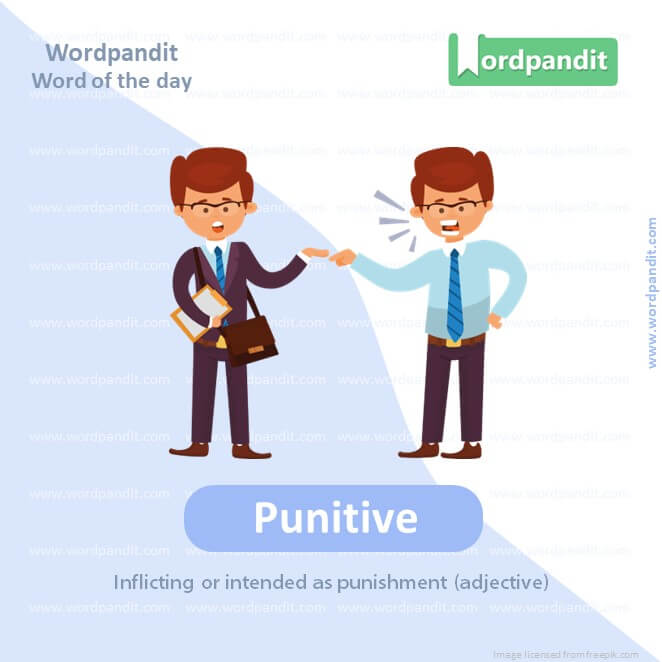
WORD-5: PUNITIVE
CONTEXT: Democrats may think that it is worth embracing punitive immigration policies for the hope of improving Mr. Biden’s polling numbers.
SOURCE: New York Times
EXPLANATORY PARAGRAPH: Imagine if you didn’t share your toys and then weren’t allowed to play with them for the whole day. This is “punitive,” which means doing something to teach someone a lesson because they did something wrong. It’s like a punishment to show that the wrong thing should not be done again.
MEANING: Inflicting or intended as punishment (adjective)
PRONUNCIATION: PYOO-ni-tiv
SYNONYMS: Penal, disciplinary, corrective, retributive, penalizing
USAGE EXAMPLES:
1. The school’s rules included punitive measures for misbehavior.
2. He faced punitive consequences for breaking the window.
3. The law imposed punitive taxes on illegal activities.
4. Punitive actions were taken to prevent further incidents.
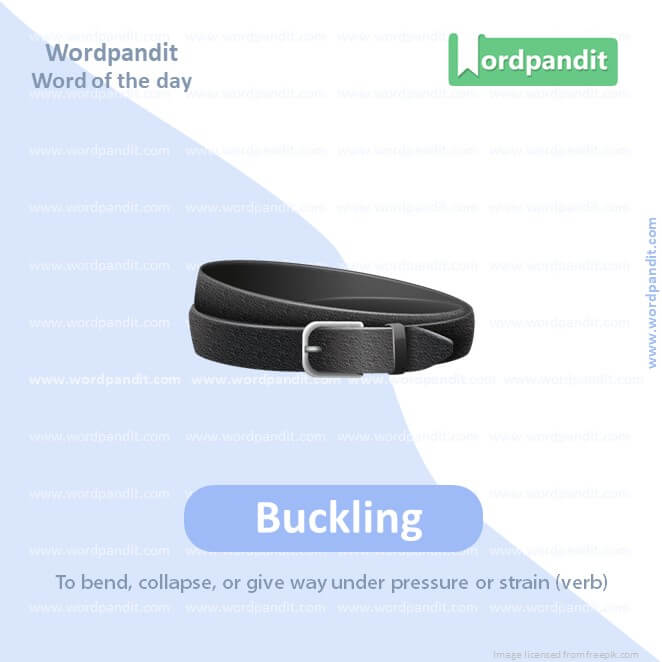
WORD-6: BUCKLING
CONTEXT: They make their way to the border and develop a federal response to help cities buckling under the strain of absorbing tens of thousands of migrants.
SOURCE: New York Times
EXPLANATORY PARAGRAPH: Think about playing with a thin plastic ruler; if you push on it from both ends, it bends in the middle. This bending is called “buckling.” It’s what happens when something cannot hold up anymore and bends or collapses under pressure.
MEANING: To bend, collapse, or give way under pressure or strain (verb)
PRONUNCIATION: BUK-ling
SYNONYMS: Bending, collapsing, yielding, giving way, folding
USAGE EXAMPLES:
1. The shelf was buckling under the weight of the books.
2. He was buckling under the stress of too much homework.
3. The bridge started buckling during the earthquake.
4. The metal poles were buckling in the high winds.
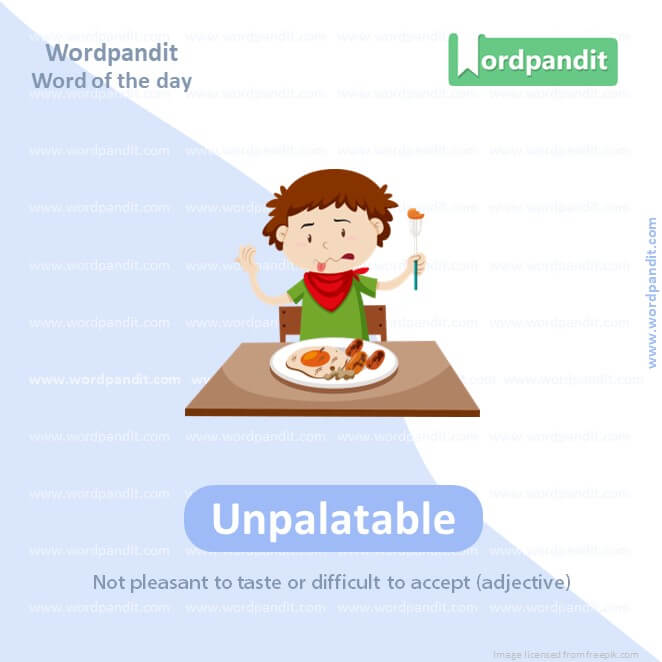
WORD-7: UNPALATABLE
CONTEXT: As unpalatable as a second Trump term would be, many pundits who tackle this question have ignored a striking fact.
SOURCE: New York Times
EXPLANATORY PARAGRAPH: Imagine you try a new food that tastes really bad, and you don’t want to eat it at all. This is called “unpalatable.” It’s when something is not nice to eat or not nice in another way, like a rule you think is unfair.
MEANING: Not pleasant to taste or difficult to accept (adjective)
PRONUNCIATION: un-PAL-a-tuh-bul
SYNONYMS: Distasteful, unpleasant, disagreeable, undesirable, unwelcome
USAGE EXAMPLES:
1. The medicine was unpalatable, but necessary.
2. They found the terms of the agreement unpalatable.
3. The vegetable soup was unpalatable and was left uneaten.
4. He expressed his opinions, which were unpalatable to some.
WORD-8: UNPARDONABLE
CONTEXT: His toadying to dictators and shunning of American allies and his unpardonable effort to steal an election — should more than offset his economic record.
SOURCE: New York Times
EXPLANATORY PARAGRAPH: Imagine if someone did something really bad, like breaking a friend’s toy on purpose and not saying sorry. This is called “unpardonable,” which means it’s something so bad that it’s hard to forgive.
MEANING: Not able to be forgiven or excused; inexcusable (adjective).
PRONUNCIATION: un-PAR-don-a-bul
SYNONYMS: Unforgivable, inexcusable, indefensible, reprehensible, unacceptable
USAGE EXAMPLES:
1. Lying in that situation was considered unpardonable.
2. The act was so severe that it was deemed unpardonable.
3. He made an unpardonable error in his report.
4. Some mistakes are considered unpardonable in professional sports.
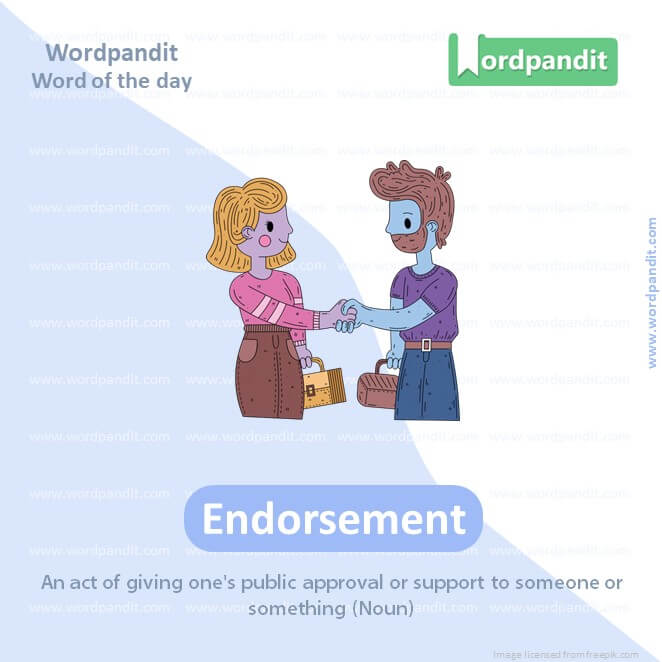
WORD-9: ENDORSEMENT
CONTEXT: The old saw that Mussolini got the trains to run on time should not be understood as an endorsement.
SOURCE: New York Times
EXPLANATORY PARAGRAPH: Think about when you show your drawing to your parents, and they say it’s great and show it to others, telling them how good it is. This is like an “endorsement.” It’s when someone supports something or someone and shows they agree with it by saying good things about it.
MEANING: An act of giving one’s public approval or support to someone or something (Noun)
PRONUNCIATION: en-DORSE-ment
SYNONYMS: Support, backing, approval, sanction, ratification
USAGE EXAMPLES:
1. The new play received strong endorsement from critics.
2. His project got the endorsement of the department head.
3. Celebrity endorsements can help sell products.
4. The policy received endorsement from several major organizations.
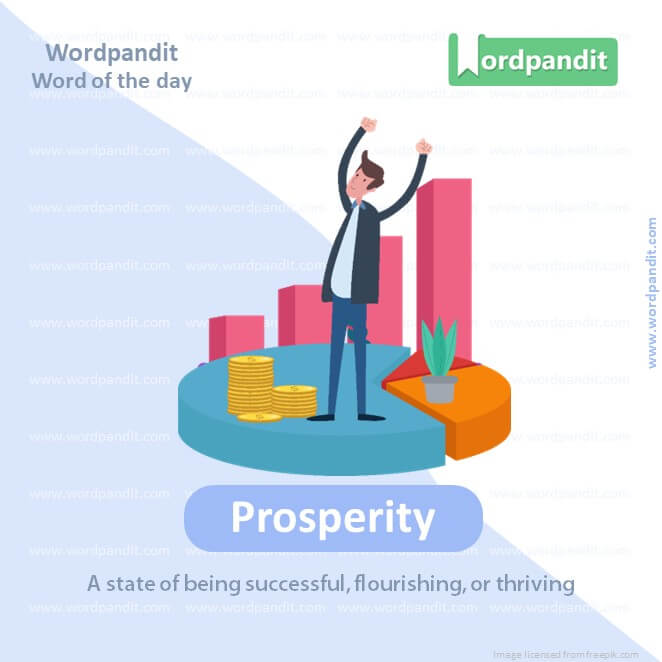
WORD-10: PROSPERITY
CONTEXT: This shows that jobs and output, while very important, are not the only economic indicators that matter. Inflation matters, too, because high inflation taxes away prosperity.
SOURCE: New York Times
EXPLANATORY PARAGRAPH: Think about a time when you feel very happy because you have everything you need like toys, friends, and family all around. “Prosperity” means when people or places have everything they need to be happy and successful. It’s like having a big, happy celebration because things are going well.
MEANING: A state of being successful, flourishing, or thriving
PRONUNCIATION: pro-SPER-i-tee
SYNONYMS: Wealth, success, affluence, well-being, flourishing
USAGE EXAMPLES:
1. The country enjoyed a period of prosperity.
2. They wished him prosperity in his new job.
3. The town’s prosperity was evident from the new buildings.
4. Economic reforms led to increased prosperity.
Vocabulary
Language is a confluence of thoughts, emotions, and experiences that find vibrant expression through words. In this spectrum, ‘vocabulary’ shines as a critical aspect that shapes and directs our language proficiency. It offers depth, nuance, and clarity to our expressions. However, mastering ‘vocabulary’ is an art that requires a strategized approach.
An intensive strategy for learning ‘vocabulary’ goes beyond the limiting precincts of memorization. Instead, it nudges learners towards comprehension and application. To understand ‘vocabulary’, take a step forward from traditional textbooks and classroom sessions, and embrace the vast world of books, articles, podcasts or digital content in the language you are learning. This step allows you to understand words in context, see how they are used in different situations, and absorb words as part of the natural flow of language.
As you journey through ‘vocabulary’, remember that this expedition should not be a race. Rather, it’s a marathon where pacing yourself is pivotal to long-term success. Learning a few words each day and consolidating your knowledge through regular revision tends to be more effective, as it prevents cognitive overload and promotes solid retention.
Interactive learning tools can provide valuable support in assimilating ‘vocabulary’. Use of flashcards, language-learning apps, or memory-enhancing software can make this process more engaging and effective, reinforcing the ‘vocabulary’ in your memory.
Lastly, practice is an incontrovertible part of mastering ‘vocabulary’. Utilize the learnt vocabulary in your daily conversations, write-ups, or presentations to ensure an active application. Doing this fosters recall and cements understanding.
In summation, learning ‘vocabulary’ is a journey that should be embraced with an integrated approach, where understanding and application are the key elements. By engaging with diverse learning resources, pacing the learning process, employing interactive learning tools, and practicing regularly, the journey of mastering ‘vocabulary’ becomes a fulfilling and enriching experience.











